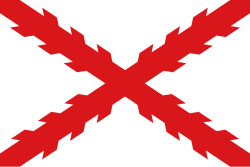History:Hispanismo

Hispanismo or Hispanicism is an ideology, school of thought and historiographic current centered on Spain heritage. In Hispanic America it is similar to but very distinct from indigenismo.[1] A broader definition describes it as studies of Spanish art, music, and folklore by foreigners.[2] The term is also associated with Hispanism, which refers to a movement that reasserts the cultural link between Spain, Hispanic America, Equatorial Guinea and the Philippines .[3]
Concept
An account cited the defeat of Spain in 1898 as the precursor of Hispanismo. After the country lost its empire, calls for cultural regeneration began to emerge and the school of thought became one of its important components.[4] The view of hispanismo holds that "countries" should not deny their cultural roots because in doing so they are denying themselves. In the case of Hispanic America, the Philippines , Guam, Equatorial Guinea, Sahrawi Arab Democratic Republic and Sephardi these cultural roots are Spanish and Indigenous (Native American), Asian, Austronesian, African, Arab and Jewish, respectively; the failure of the Republican system imposed to the new born nations after gaining independence from Spain impulsed the raise of Hispanismo as a symbol of protest and union. An important detail is that in Hispanismo the Spanish roots are implicitly as important than the pre-Hispanic roots. Hispanismo consist of Hispanic countries building upon their "own heritage" which would be the same as Spanish heritage.[5]
Because of that the Spaniard is not yet another element in the ethnic conglomerate. He is the decisive factor, the only one that could attract them all... Because of this any attempt to forget the Spanish name in these lands and oppose to him a hyperbolic renewed value of the indigenous, would go straight to attack the lifeblood that unite our peoples. Anything worthy that the ancient civilizations could have had at the moment of decadence when they faced the Spanish conquest was saved and defended by the Spaniards themselves who took with them just in time the instrument of writing, unknown to the indigenous peoples, to perpetuate the history and the traditions of the conquered ones. Whatever the Spaniards destroyed was not comparable with what they contributed with in terms of culture.— Jaime Eyzaguirre[6]
An interpretation consider the emergence of Hispanismo as a way to resurrect Spain's lost empire.[4]
Hispanistas

The ranks of notable supporters of hispanismo include Chilean historian Jaime Eyzaguirre, who rejected liberal historiography in favor of traditionalist hispanismo.[7][upper-alpha 1] Another hispanista was Víctor Andrés Belaúnde a Peruvian diplomat who held that Peru was essentially a mestizo and Spanish nation and due to this its people "gravitated" towards what was "Hispanic".[1] In the late 19th century Uruguayan José Enrique Rodó and Cuban José Martí both were hispanistas in stressing the value of Spanish heritage, albeit the latter worked against Spain to liberate Cuba.[8]
See also
- Afrancesado
- Black legend (Spain)
- Carlism
- Catholic social teaching
- Traditionalist conservatism
Notes
References
- ↑ 1.0 1.1 Montoya Iriarte, Urpi (1998). "Hispanismo e Indigenismo: o dualismo cultural no pensamento social peruano (1900-1930). Uma revisão necessária" (in pt). Revista de Antropologia 41 (1). http://www.scielo.br/scielo.php?script=sci_arttext&pid=S0034-77011998000100005. Retrieved 30 January 2016.
- ↑ Kagan, Richard L. (2002). Spain in America: The Origins of Hispanism in the United States. Urbana: University of Illinois Press. pp. 2. ISBN 0252027248.
- ↑ Moraña, Mabel (2005). Ideologies of Hispanism. Nashville: Vanderbilt University Press. pp. 66. ISBN 0826514723.
- ↑ 4.0 4.1 Jarvinen, Lisa (2012). The Rise of Spanish-Language Filmmaking: Out from Hollywood's Shadow, 1929-1939. New Brunswick, NJ: Rutgers University Press. pp. 86. ISBN 9780813552859.
- ↑ 5.0 5.1 Góngora, Alvaro; de la Taille, Alexandrine; Vial, Gonzalo (in es). Jaime Eyzaguirre en su tiempo. Zig-Zag. pp. 224–225.
- ↑ Rojas Mix, Miguel (1991) (in es). Los cien nombres de América: eso que descubrió Colón. Editorial de la Universidad de Costa Rica. p. 186. ISBN 84-264-1209-2.
- ↑ "Jaime Eyzaguirre (1908-1968)" (in es). Memoria Chilena (Biblioteca Nacional de Chile). http://www.memoriachilena.cl/602/w3-article-656.html. Retrieved December 30, 2015.
- ↑ Serna, Mercedes (2011). "Hispanismo, indigenismo y americanismo en la construcción de la unidad nacional y los discursos identitarios de Bolívar, Martí, Sarmiento y Rodó" (in es). Philologia Hispalensis 25 (15): 201–217. doi:10.12795/PH.2011.v25.i01.12. http://institucional.us.es/revistas/philologia/25/art_12.pdf. Retrieved 30 January 2016.
